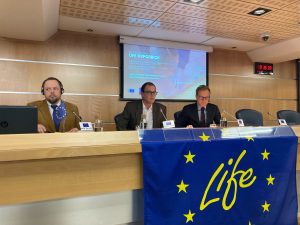Madrid/Castellón March, 30th, 2023. The consortium of the European project LIFE HYPOBRICK, coordinated by the Instituto de Tecnología Cerámmica (ITC-AICE) has celebrated today in Madrid, in the Europa Room of the representation in Spain of the European Commission, the final event of the project which has been attended by 88 people and which has presented both the characteristics and the results and progress of this action that has been supported by the European Commission through the LIFE Programme (Ref.: LIFE18 CCM/ES/001114).
The event, entitled: “Towards a sustainable, circular and CO2-free construction: new materials and processes”, explained the implementation of a new brick manufacturing process with extremely low energy consumption, with the consequent reduction of greenhouse gas emissions into the atmosphere, and with the use of waste as a starting material, specifically, glass from cathode ray tubes, which currently go to landfill, and fired ceramic waste. The firing stage has been eliminated, being replaced by alkaline activation, at a process temperature of around 80ºC and with a reduction in CO2 emissions of 68% taking into account the emissions from the preparation of the alkaline activators. In addition, a demonstrator consisting of a wall 20 metres long by 3 metres high has been built using 9,000 bricks, located at the entrance to the Ladrillos MORA facilities in Illescas (Toledo). These sustainable bricks measure 24x11x4 cm3 and have a mass of approximately 2 kg.
The opening of the international event was attended by representatives of the European Commission in Spain, the general supervisor of the project in Europe, Kryzstof Wojcik, belonging to the LIFE PROGRAMME (CINEA), and Doctor Javier García-Ten, head of the Ceramic Materials and Technologies Area of the Institute of Ceramic Technology (ITC-AICE), who has led the research at the institute. After the opening, Kryzstof Wojcik explained the characteristics of the LIFE Programme and the good practices and new opportunities it offers. As mentioned, he is, in addition to being part of the European Executive Agency for Climate, Infrastructure and Environment, the European supervisor of LIFE HYPOBRICK.
Next, Dr. Ana Mezquita, Senior Researcher in the Sustainability Area of ITC-AICE, explained the European context and the requirements in energy policies. This was followed by Antonio Mateos, Energy Director of the Association of Fired Clay Brick and Roof Tile Manufacturers in Spain (HISPALYT).
Dr. María Criado, from the Instituto de Ciencias de la Construcción Eduardo Torroja (CSIC) entitled her talk: “!Creating new bricks!: alkaline activation technology”.
Afterwards, Dr. Mónica Vicent, one of the main developers of LIFE HYPOBRICK at ITC-AICE, gave her lecture: “LIFE HYPOBRICK: Towards a low-carbon economy. Development of “unfired” construction materials from waste”, while Diego García-Forgeda, from the company Ladrillos MORA, a participant in the project, spoke on: “Zero emissions: adaptation of the ceramic manufacturing systemThe next speaker was Jens Geduhn from the German company Schlagmann Poroton GmBH&Co.KG, also a participant in the LIFE HYPOBRICK project, followed by another member of the project consortium, Professor Wolfgang Krcmar from the University of Nuremberg (THN), who explained the current state of research in geopolymers for building materials.
In conclusion, this event has shown that LIFE HYPOBRICK is an example of circular economy, having made it possible to manufacture sustainable bricks from waste from other sectors and without using the firing stage, thus contributing to the fight against the negative effects of climate change.
All the information: www.lifehypobrick.eu



